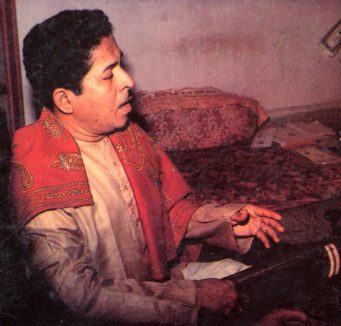
Jitendra Abhisheki
(1932-1998)
♫ Konkani Song
[AIR Mumbai, c. 1965, Composer: Jitendra Abhisheki, Lyric: B.B. Borkar]
♫ Raga Paraj [Goa, 1985]
♫ Bhajan [Goa, 1985]
♫ Bhairavi – Babul mora [Goa, 1985]
About Jitendra Abhisheki
The tiny ward Mangeshi in the village of Priol takes its name after Mangesh, an epithet of Lord Shiva. It is known for its iconic, eponymous temple. Mangeshi’s cachet does not derive solely from its historical and religious significance. It has long nourished aspirants in music and dance.
Dinanath Mangeshkar was born here and grew up around the temple courtyard. His daughters Lata and Asha are known worldwide. As we saw earlier, Kesarbai Kerkar’s earliest stirrings in music can be traced to the bhajans she absorbed in Mangeshi as a child.
Jitendra Abhisheki was born in Mangeshi in a family of priests charged with officiating at the temple. Abhisheki’s father, Balubuwa, was a pandit and a keertankar who passed on his love of Sanskrit and music to the young Jitendra.
Abhisheki’s formal instruction in music began under Girijabai Kelekar from the neighbouring village of Bandoda (sister of Jyotsna Bhole, the famous Marathi stage singer and actress). After imbibing the essentials, he left for Bombay to take taleem under Azmat Hussein Khan, a master vocalist affiliated with Agra, Khurja, and Atrauli gharanas.
Abhisheki later enrolled as a disciple of the learned musician and composer, Jagannathbua Purohit “Gunidas.” This helped fortify his ragadari, performance technique, and amass a wealth of musical compositions.
A restless soul and a seeker of all that is sublime and noble in music, Abhisheki’s mind was uncontaminated by narrow dogmas. In the 1960s he journeyed to Allahabad, to the home of the cerebral composer-musician Ramashreya Jha “Ramrang.” He learnt several of Jha-sahab’s compositions directly from the composer and made them a fixture in his concerts. These peregrinations in search of musical pearls was a constant theme in Abhisheki’s early life.
Abhisheki ranks among the great composers of the 20th century. His creative oeuvre discloses a versatile mind and an agile imagination. He was singlehandedly responsible for the revival of the Marathi drama in the 1960s and 1970s through his brilliant scores for musicals such as Matsyagandha, Hey Bandh Reshamache, Katyar Kalzat Ghusli, and Yayati Devayani, to name a few. Abhisheki’s talent for wrapping melody around the written word is clearly manifest in this body of work. He enjoyed a fruitful collaboration with Goa’s poet-laureate Bakibab Borkar, lending music to Bakibab’s verse.
The consummate nadayogi shuffled off this mortal coil on November 7, 1998 in Pune.
